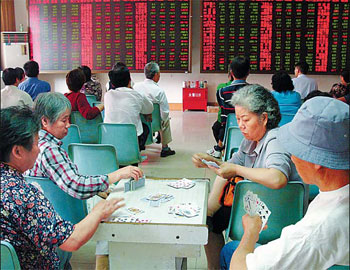The earthquake in Sichuan province on Monday raised some concern in the mainland stock market, but is not expected to have too much of an impact on individual companies' performances and investor sentiments.
Although the full extent of the damage is still unclear, analysts said they expect earnings of companies in infrastructure, transportation, electricity and tourism industries in Sichuan and Chongqing, such as Sichuan Minjiang Hydropower Co Ltd, will take a mild hit.
The Shanghai and Shenzhen stock exchanges yesterday temporarily suspended trading of 66 listed companies based in Sichuan and Chongqing as a precautionary measure.
Earnings of some insurance companies may be affected by the projected payments of earthquake damages claims.
"The compensation amount won't be very big because many of the major listed insurance companies have bought sufficient re-insurances, which could disperse their burden," said Zhou Guang, an analyst at China International Capital Corp Ltd.

The production of listed non-ferrous companies in Sichuan and Chongqing, such as Sichuan Hongda Co Ltd and Sichuan Atlantic Welding Consumable Co Ltd, are expected to be hit by the quake.
"Production of aluminum and supply of lead and zinc will shrink in that district, but its impact on the country will be milder because of its small share in China's total production and demand," said Ge Jun, an analyst at Changjiang Securities.
The quake may increase the inflationary
| Investors play cards in front of an electronic board at a securities house in Yichang, Hubei province.? |
pressures. Sun Mingchun, an economist at Lehman Brothers, said: "The quake increases upside risks to China's inflation outlook, especially on food price inflation."
Arable land in Sichuan and Chongqing represents 8.2 percent of the national total and their grain output accounted for 9.2 percent of the national output in 2006. Their rice output, in particular, is 9.4 percent of the national total, according to Lehman Brothers statistics.
"The earthquake could exacerbate the rice supply problems and push up rice prices further, given the recent shortages in the global rice market," said Sun.
Zhang Fan at Changjiang Securities said: "The hog supply from southern Sichuan, a major pig rearing base, is expected to be hampered, mounting more inflationary pressure. That will probably prompt further tightening monetary measures, narrowing corporate earnings."
Sales of medical companies are expected to be boosted by demand from disaster areas, and manufacturing companies will benefit from reconstruction, analysts said.
(China Daily May 14, 2008)